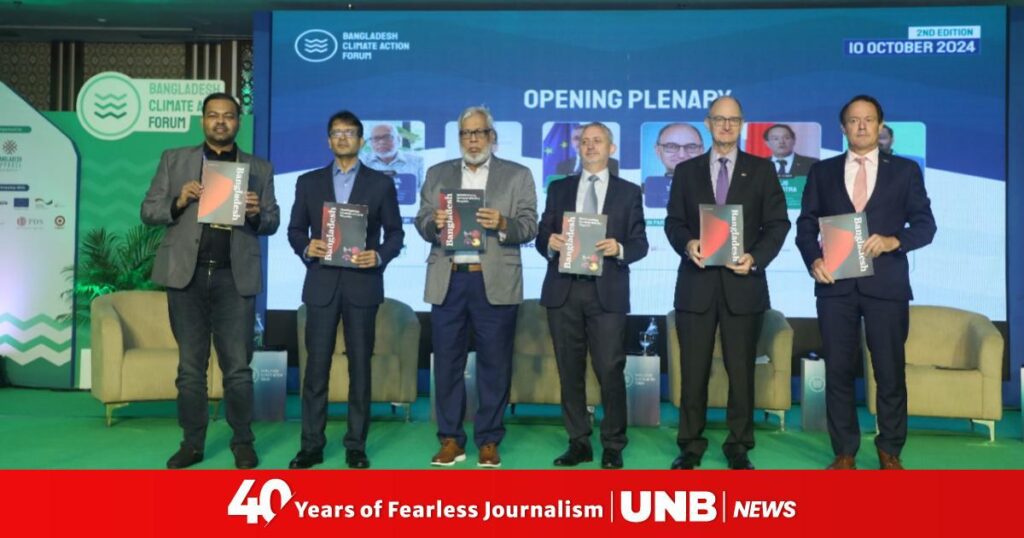Chief Adviser’s Special Envoy for International Affairs Lutfey Siddiqi on Thursday said climate transition is a real risk that they need to be mindful of.
“We should not treat it as a compliance issue but a proper business strategy issue where we can stand out as the superior standard,” he said at “Bangladesh Climate Action Forum 2024” held at a Dhaka hotel.
As entrepreneurs and as businesses, Lutfey said, it matters how they produce things.
“Not just what we produce at the cheapest cost,” he said.
Youth-led climate diplomacy takes the spotlight at LCOY 2024
Over 450 delegates from across the globe came together to foster dialogue, collaboration, and actionable strategies to advance Bangladesh’s sustainability goals.
Bangladesh Apparel Exchange (BAE) organized the forum as a pivotal platform uniting industry leaders, government officials, climate advocates, innovators, brands, development organizations, policymakers, and academics.
This year’s event featured keynote addresses, panel discussions, presentations, and workshops, where about 40 national and international experts shared insights on building a climate-resilient and carbon-neutral future through collaboration and innovation and the launch of two significant initiatives dedicated to enhancing sustainable practices in Bangladesh.
Key partners supporting the forum included the Apparel Impact Institute, Cascale, the European Union, GIZ, H&M, the Embassy of the Netherlands in Bangladesh, PDS Limited, and Target.
Upstream, downstream countries must work together to tackle climate change: Rizwana
“We have a shared obligation to act”
Power, Energy, and Mineral Resources Adviser Dr M Fouzul Kabir Khan at the forum said, “Our renewable energy penetration is low – 2%; we want to move it upwards.”
He said they are moving on to larger systems with higher sustainability capacities. “I hope you will join us in the journey to sustainability and take the country forward.”
Ambassador and Head of Delegation of the European Union to Bangladesh Michael Miller said, for countries like Bangladesh, among one of the most climate vulnerable countries in the world, every fraction of a degree in global temperature increase matters.
“We have a shared obligation to act. Global gateway aims to mobilize up to 300 billion euros of public and private investments by 2027 through a combination of grants, concessional loans, and guarantees to de-risk investments,” he said.
Ambassador of the Federal Republic of Germany Achim Tröster said energy security is a critical concern for both Bangladesh and Germany.
“With Bangladesh emerging as a major regional economic power, it is vital to ensure that its energy needs are met in a way that is sustainable, secure, and resilient to the challenges posed by climate change,” he said.
Charge d’Affaires of the Embassy of the Kingdom of the Netherlands Thijs Woudstra said, “I’m really happy that the garment industry is moving forward to decarbonization and advancing positive climate action considering the national and global energy crisis.”
South Korea keen to support interim government in improving investment climate
“I’m very much looking forward to a relationship with the Bangladeshi garment sector and private sector to play an important role in advancing sustainable and circular textile in Bangladesh and continue knowledge sharing between our two countries.”
Mostafiz Uddin, Founder & CEO of Bangladesh Apparel Exchange, said, “You care about the planet, you care about the country, and that is why all of you are here today. All of you are my inspiration. Climate action is no more a burden. For entrepreneurs, it’s a business opportunity.”
“This is how I think. For all of you, you all love Bangladesh and want to eliminate poverty and disasters. Cheap labor is no longer a competitive advantage for Bangladesh. If we as entrepreneurs do not achieve the target set by our clients, we will not be able to succeed. To achieve the targets, the manufacturers need more shared responsibility, collaboration, and support.”
The event unites many contributors such as the Ministry of Foreign Affairs; Ministry of Power, Energy, and Mineral Resources; Ministry of Environment, Forest and Climate Change; the Bangladesh Power Management Institute (BPMI); the Embassy of Denmark in Bangladesh; the Embassy of France in Bangladesh; the Embassy of Sweden in Bangladesh; ILO; Laudes Foundation, Oxfam in Bangladesh; and USAID Bangladesh.
Additionally, an engineering workshop showcased the expertise of industry-leading organizations, including Armstrong Fluid Technology, Forbes Marshall, Grant Thornton Bharat LLP, Illukkumbura Industrial Automation (Pvt) Ltd., and Jinko Solar.
Over 300 engineers from apparel manufacturing units participated, gaining practical strategies to drive sustainability and decarbonization efforts within their organizations.
The Bangladesh Climate Action Forum 2024 has significant importance as a catalyst for dialogue and collaboration among various stakeholders, organizers said.
By enhancing climate leadership and technical skills, they said, the forum plays a crucial role in propelling the nation toward a sustainable and resilient future.

